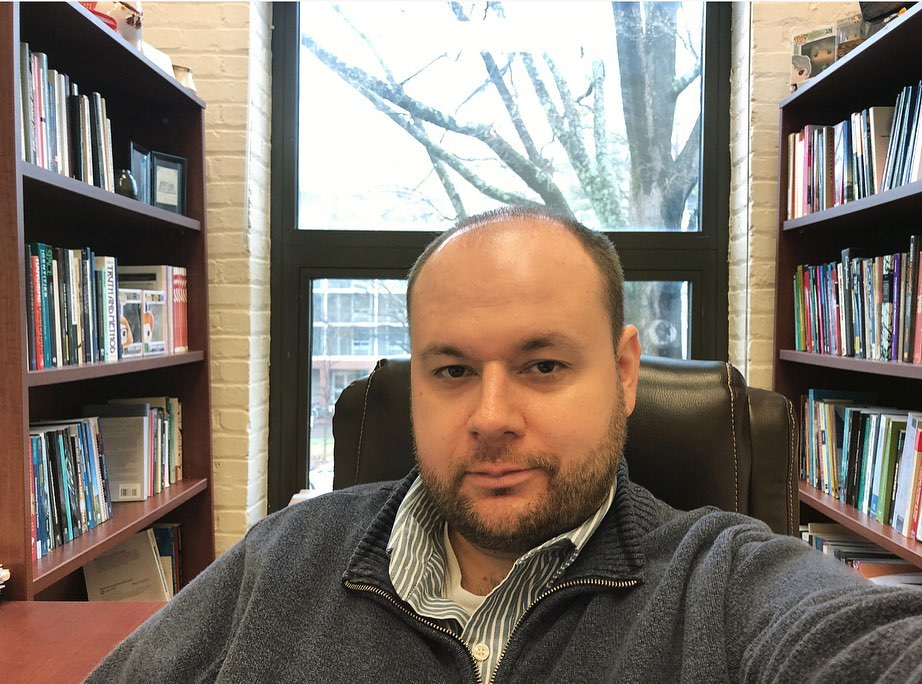Zachary Beare

Bio
Dr. Zachary Beare is a specialist in Rhetoric and Composition. At NC State, Dr. Beare serves as the Director of the First-Year Writing Program. He is also co-editor of Composition Studies, the oldest independent journal in the field of composition and rhetoric.
Outside of the academy, Dr. Beare is a rabid consumer of all types of media (books, movies, music, tv, art), and he enjoys cooking and baking and exploring regional hiking trails.
Office Hours
Tuesdays: 11-Noon
Wednesdays: 2-3pm
Thursdays: 11-noon
And by appointment.
Research Publications
Stenberg, S. and Beare, Z. (2024) “Acts of Recognition: A Study of Faculty Writers’ Experiences of Engaging Peer Review.” College Composition and Communication. 75(4), 620-646.
Stone, M. and Beare, Z. (2024) “Choice, Shame, and the Neoliberal Affective Politics of Nurx’s App-Based Reproductive and Sexual Healthcare.” In H. Brook Adams and N Myers (Eds.) Inclusive Aims: Rhetoric’s Role in Reproductive Justice (179-198). Parlor Press.
Beare, Z., Masterson, J., and Stenberg, S. (2024) “To Reimagine…to Start Again: Pedagogy and Possibility in the (Post)COVID-19 University.” Pedagogy, 24(2), 157-167.
Beare, Z. (2022). “Prescribe for Me, Doctor, for I Have Sex: Rhetorics of Empowerment, Queer Shame, and the Confessional in PrEP Prescribing.” In J. Rhodes and J. Alexander (Eds.), Routledge Handbook of Queer Rhetoric (223-232). Routledge. DOI: 10.4324/9781003144809-31
Beare, Z., and Stone, M. (2021). “By Queer People, For Queer People, FOLX, Plume, and the Promise of Queer UX.” The 39th ACM International Conference on Design of Communication (SIGDOC ’21), October 12-14, 2021, 1-6. https://doi.org/10.1145/3472714.3473618
Beare, Z. (2021). “Cross Postings: Disciplinary Knowledge-Making and the Affective Archive of the WPA Listserv.” Composition Studies, 49(1), 42-59.
Beare, Z., and Stenberg, S. (2020). “‘Everyone Thinks It’s Just Me’: Exploring the Emotional Dimensions of Seeking Publication.” College English, 83(2), 103-126.
Stone, M., and Beare, Z. (2020). “Technical Rhetorics and Reproductive Justice, Reproductive Rights, and Reproductive Health.” Reflections: A Journal of Community-Engaged Writing and Rhetoric, 20(2), 15-25.
Beare, Z. (2018). “Softies Like Me: The Foolish Work of a Fat Queer Pedagogy.” Writing on the Edge, 29(1), 78-90.
Beare, Z. (2018). “The Strange Practices of Serendipitous Failure: Considering Metanoia as an Alternative to Kairos.” In M.D. Goggin and P. Goggin (Eds.), Serendipity in Rhetoric, Writing, and Literacy Research (257-266). Logan, UT: Utah State UP.
Beare, Z. and Meade, M. (2015). ‘”The Most Important Project of Our Time!’: Hyperbole as a Discourse Feature of First-Year Writing.” College Composition and Communication, 67(1), 64-86.
Beare, Z. (2015). “It Gets Better…All in Good Time: Messianic Rhetoric and a Political Theology of Social Control.” The Journal of Cultural Research, 19(4), 352-364.
Beare, Z. (2011). “Michael Field’s Renaissance: An Examination of Paterian Influence, Gender Play, and the Use of the Ekphrastic Form in Sight and Song.” The Pater Newsletter: A Journal of the International Walter Pater Society, 56/57, 18-27.
Education
B.A. English-Literature Western Washington University 2008
M.A. English Studies Western Washington University 2010
Ph.D. English-Composition and Rhetoric University of Nebraska 2017
Area(s) of Expertise
Dr. Beare has a wide range of teaching and research interests. Broadly, he studies how emotion and identity mediate rhetorical activity. Also, in line with his administrative appointment, he is interested in teacher development and pedagogy. Within those areas, he is especially interested in queer and feminist approaches to teaching composition, the ways that emotion and embodiment shape the work of the classroom, and curricular revisions incorporating multimodal compositions with imagined public audiences.
As secondary interests, Dr. Beare is interested in how disciplinary knowledge making and academic life have changed in the digital age and how academics use new media and social media, and he also does work on the rhetoric of health and medicine (specifically on queer and reproductive health).